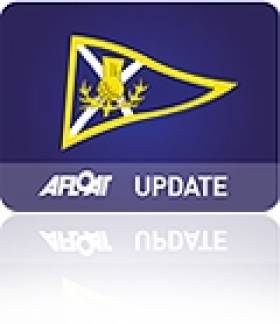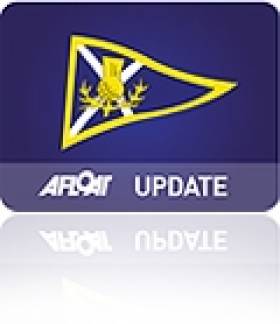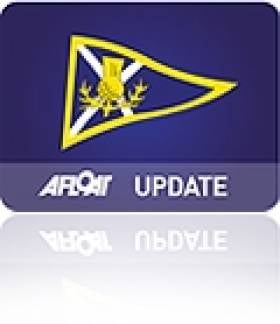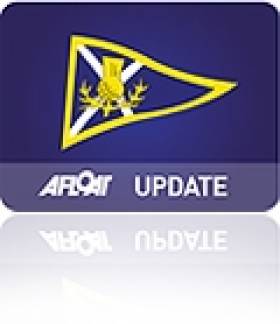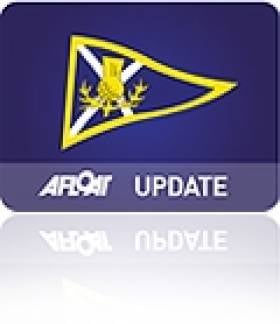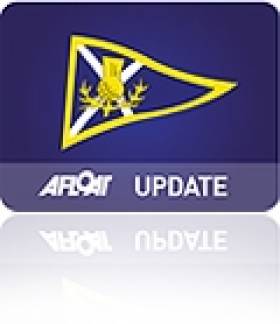Displaying items by tag: scottish series
O'Leary Hunts for Third Scottish Title
Royal Cork's Anthony O'Leary, who has won the Scottish Series award twice, is in Tarbert bidding to win for a third time 30 years exactly since the Trophy first went to Ireland when it was won by Frank Woods on the Castro designed One Tonner Justine III. This year Irish travellers to Scotland are down as is the overall attendance for tomorrow's event.
For all that the total entry may have compacted down in recent years due largely to the pressures of the global economy and the net consequence of more carefully allocated holiday or leisure times, the core entry for the Brewin Dolphin Scottish Series is as richly laden with high quality talent and past winners as ever.
The north of Britain's most prestigious annual sailing regatta starts Friday morning and the 107 crews look like they are in for more breezy weather on Loch Fyne. Of course over more than 30 years of racing on the loch, strong winds are nothing new.
Regulars who year in year out set aside the May Bank Holiday weekend to race on the spectacular waters of the sea loch, have returned to work each Tuesday as often with sunburn as they have borne the obvious effects of four days in unrelenting wind and chilly temperatures.
But the majority of these next few days seem set to be given over to the latter.
It will matter little to the hard core. Four skippers will be looking to match Jonathan Anderson's record of three overall Scottish Series wins. Perhaps the best chance of achieving this hallowed hat-trick rests again with Hamish Mackay who won in consecutive years 2001 and 2002.
Ten years on from that last win Mackay, past Chairman of the Royal Yachting Association will be helping campaign a J97 Jackaroo in IRC Class 4, which recently dominated at the warm-up Savills Regatta on the Clyde winning the overall top trophy.
Clyde sailmaker John Highcock is also bidding for a third win of the overall top award, after helping veteran John Corson to secure the Brewin Dolphin Scottish Series Trophy last year with his Corby 33 Salamander XX. The same team which won last year remains intact, with the boat unchanged from victory last May.
Chris Bonar, who won in 1985 and 1997, returns with his crew on Bateleur 97, a BH36 which competes in IRC Class 1 up against Anthony O'Leary, from Royal Cork YC, who has also won the top award twice.
Racing starts Friday for all classes and concludes Monday.
"It looks like it will be a nice compact regatta during which we can maximise our ability to run good racing, and the amenity values of Tarbert will be at their highest. It is gratifying to see that the IRC and the CYCA Handicap classes' entries have stood up well. And after the event we will look a little closer at why the entries for some of the sporstboat and smaller one design classes are down," said John Readman, chair of the Brewin Dolphin Scottish Series organisers the Clyde Cruising Club.
The event is the usual Sunday Race for CYCA yachts taking part in the Brewin Dolphin Scottish Series, but is now open to those unable to take part in all four days of racing over the bank holiday weekend.
The race sees yachts setting off from Tarbert, sailing round the southern part of Loch Fyne before rounding Inchmarnock Island and finishing at Tarbert.
Interested sailors are invited to log on to www.brewindolphinscottishseries.com for more information and the entry form.
Johnnie Readman, event organiser, said "We decided to open the Round the Island event to encourage those keen to take part in the Scottish Series but aren't able to assemble a crew for the whole weekend, to sign up and get involved for one day.
"It's set to be a great event with a good number of yachts lined up already. What's more, being in Tarbert on the Saturday and Sunday nights means sailors can take part in the shoreside festivities Tarbert is renowned for as well, including fireworks on Saturday and an aerobatic display on Sunday."
The 2011 Brewin Dolphin Scottish Series takes place over the bank holiday weekend from Friday 27 to Monday 30 May in Tarbert, Loch Fyne in the Clyde Estuary. Three race areas on the broad waters of the Loch will provide separate racing for IRC classes; One Design classes and CYCA classes (with and without spinnakers).
2011 Scottish Series Entry Form Online Now
Last year 133 boats and their crews took part, and event organiser Clyde Cruising Club is hoping to beat this figure in 2011, encouraging sailors thinking about entering to sign up while the early bird discount is available.
Johnnie Readman, event organiser, said "Last year's event was a huge success and I have no doubt that this year's competition will be even more fun.
"We have introduced a number of changes this year in order to offer variety and encourage more entries from the UK and abroad. The changes include new courses and variations for all fleets, the introduction of a short Inshore Coastal race for IRC classes, some shore based starts for the CYCA classes, and replacement of the IRC sportsboats handicap starts with One Design class starts.
"We would encourage all sailors interested in coming along to sign up as soon as possible."
The 2011 Brewin Dolphin Scottish Series takes place during the bank holiday weekend from Friday 27 to Monday 30 May in Tarbert on Scotland's stunning West Coast.
Scottish Series Sponsorship Continues
The Scottish Series has thrived during Brewin Dolphin's eleven year sponsorship growing awareness and numbers over the period. The event, which generates around £1 million each year for the local economy, has been running for over 30 years and attracts over 1,200 competitors to the picturesque Loch Fyne, over the May holiday weekend.
Commenting on the decision, Jamie Matheson, chairman of Brewin Dolphin, said, "We are pleased to announce our continued sponsorship of the world renowned Scottish Series. Our name has become synonymous with the event and we are delighted to be able to support it for yet another year."
Howard Morrison, Commodore of Clyde Cruising Club, event organisers, added, "The Scottish Series is a key event in the sailing calendar and we would like to thank Brewin Dolphin for their continued sponsorship of the Scottish Series. The funding will not only help develop the event, but also benefit sailing across Scotland."
Brewin Dolphin also sponsors the under 16 and under 18 youth rugby competition, the Scottish Schools Cup, which sees over 4,500 children taking part each year. As lead sponsors of both competitions, Brewin Dolphin has been able to support the drive to increase participation in both sports, whilst communicating with its target audiences.
Last Chance For Scottish Series
With just over a week to go until the Brewin Dolphin Scottish Series sets sail, double Gold Olympic medalist Shirley Robertson, is calling on sailors from across the UK, and further a field, to sign up to this year’s event.
Shirley Robertson OBE, event ambassador, said: “The Brewin Dolphin Scottish Series is Scotland’s premier sailing regatta and I would encourage all enthusiasts to take up the challenge and be part of the successful event.
“Tarbert, Loch Fyne, is a fantastic location with perfect conditions for a challenging and exciting sailing experience. Scotland’s west coast has a lot to offer on the water but also shoreside socially, and I urge those thinking about entering the Scottish Series this year to do so as it’s a great weekend had by all who attend.”
Over 130 boats from across UK and beyond have already signed up, including previous competitors Fiona Hicks, Gery Trentesaux and Anthony O’Leary. As well as regular participants such as Chris Tiso on Thunderbird of Rhu and Boyd Tunnock on his boat Lemarac.
Event organiser, Jeremy Glen, said “A number of past competitors are returning again this year and we have a number of new boats on board which is testament to the success of the event.
“Sailors who sign up will experience an action packed weekend of sailing and shoreside activity in Tarbert where there is never a dull moment. It’s a fantastic way to spend the bank holiday weekend, so here’s hoping for some sunshine to top off the weekend experience.”
French Present Main Challenge for O'Leary in Scotland
In preparation for this year's Commodore's cup ICRA members will be interested to know that France is fielding a strong sailing challenge at the Scottish series in two weeks time which means Royal Cork's Anthony O'Leary will get all the competition he is looking for and more when he arrives on Lough Fyne.
Both French teams will compete in IRC Class 1 at the Brewin Dolphin Scottish Series up against two previous winners of the overall Scottish Series Trophy, Ireland’s Anthony O’Leary on the Ker 39 Antix and three times winner Jonathan Anderson on Playing FTSE.
The magic of the Brewin Dolphin Scottish Series continues to spread into Northern Europe and the premier regatta in the north of Britain has drawn two key French entries among the fleet which is set to muster on Loch Fyne from May 28-31st.
The regatta has become a firm favourite with a small number of French skippers and crews and there have been regular visits from competitors from Brittany and beyond.
In particular, as well as the excellent IRC handicap racing, the French visitors who make the long passage up the Irish Sea enjoy the relaxed ambience of the regatta and this historic, picturesque setting of Tabert which is similar to their native coastline.
In 2008 the overall Scottish Series Trophy went to France for the first time when Gery Trentesaux skippered and steered his La Trinite based Beneteau First 45 to win Class 1. Trentesaux had been one of the most regular visitors from France over the recent history of the Scottish Series. Twice Trenteseaux has captained victorious teams to win the Rolex Commdore’s Cup, the most sought after international offshore racing team Trophy, but he has been a Scottish Series disciple for many years, spreading the word to his compatriots.
Jacques Pelletier is from the same mould as Trenteseaux, a keen offshore racer who enjoys the challenge of travelling to regattas and races which interest him and his crew. He was due to race last year but had to withdraw at the last minute, but raced at Tarbert three times before, most recently in 2008.
He, too, has twice represented France in the Commodore’s Cup. A retired businessman from Paris, Pelletier has done seven Figaro races across the Atlantic.
Newcomers this year are the St Malo based crew of the J122 Nutmeg IV, owned and skippered by Francois Lognone.
“It is the first time we come to Scotland to race but all of our French friends who have already raced in past years at Tarbert always return talking of the magic. So this year we will race, and go on and do a little bit of cruising. We have had the boat for three years, but from St Malo we regularly compete at Cowes Week, the Fastnet and the Round the Island race. But we are not at the same level as Géry Trentesaux!” remarks Lognone.
Ends



























